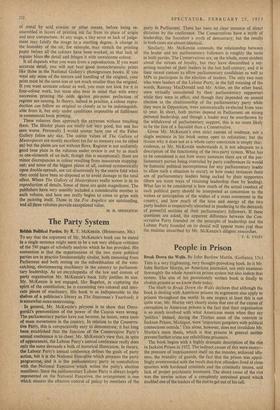People in Prison
The blurb to Break Down the Walls declares that although the book is dealing with American prisons its arguments also apply to prisons throughout the world. In one respect at least this is not quite true; Mr. Martin very clearly states that one of the causes of corruption in American prisons is the fact that their organisation is so much involved with what Americans mean when they say 'politics.' Indeed, during the Thirties some of the convicts in Jackson Prison, Michigan, were 'important gangsters with political connections outside.' This alone, however, does not invalidate Mr. Martin's main thesis, which is that prisons in general neither prevent further crime nor rehabilitate prisoners.
The book begins with a highly dramatic description of the riot in Jackson Prison in 1952. The indirect causes of this were many—
the pressure of imprisonment itself on the inmates, enforced idle- ness, the brutality of guards, the fact that the prison was appal- lingly overcrowded with the result that first offenders lived at close From his survey of the Jackson Prison riot, Mr. Martin passes on to a searching inquiry into the whole American penal system. He compares the federal with the state prisons, he criticises even the well-organised prisons such as Joliet, which controls its inmates by a rigid system of discipline and maximum security. But Mr. Martin also penetrates farther than this; he exposes the inequitable laws by which in one state a man might serve a life-sentence for a crime which in another would be punished by only a few months' imprisonment.
There is in fact, nothing remotely connected with crime which Mr. Martin does not consider with the utmost thoroughness and, which is more important, with great compassion. Prisons, as he says, are no longer places where men are sent merely for punish- ment; it is also hoped that the convicts will be rehabilitated. Mr. Martin does not believe that prisons ever can have such an effect, but, though his arguments against prison as a rehabilitative measure are extremely persuasive, I think he goes rather far when he says : 'Rehabilitation in prison today is a pie-in-the-sky idea. . . . Nothing could be more pathetic than the sight of a mangled kid from the slums hopefully, almost prayerfully . . . clinging to the dream that one day he will awake to find himself rehabilitated.' I would have thought that such a prisoner was more than half-way to being rehabilitated by the very fact that he willed hard to be so.
However, it is on a vastly more important issue that I disagree fundamentally with Mr. Martin. Though he exposes skilfully the lack of success met with by psychiatrists, biologists and sociologists in their researches into the causes of crime, I think that he is extremely naive himself, unrealistic even, when he says : 'Once we have discovered what makes men criminal, we shall know how to rehabilitate them.' Such a remark would lead one to suppose either that Mr. Martin does not believe in the existence of evil, or that he thinks half the world's troubles can be eased by the researches of a few scientists. This, surely, is a real 'pie-in-the-sky idea.'
Mr. Martin concludes Break Down the Walls with a passionate plea for the abolition of prisons. He suggests that many prisoners could be released today for their own great good and without any danger to society. He advocates more thorough probation and parole systems, farms or prison camps on public lands for many sentenced men, and close guard and maximum security only for the dangerous psychopaths and the criminally insane. Such sug- gestions will surely meet only with approval from all humane people. But the trouble with such suggested reforms is that it is easy to state them but very difficult to find the means to put them into practice. One wishes that Mr. Martin had not confined his really sensational ideas to a brief concluding chapter.
This is, however, a very impressive book indeed. It forces one to consider the pain, unhappiness and despair that even the most en- lightened prison produces in the minds and hearts of its inmates. It will make us think extremely carefully before we say, again, 'He ought to be locked up for it.'
ELIZABETH JENNINGS











































 Previous page
Previous page